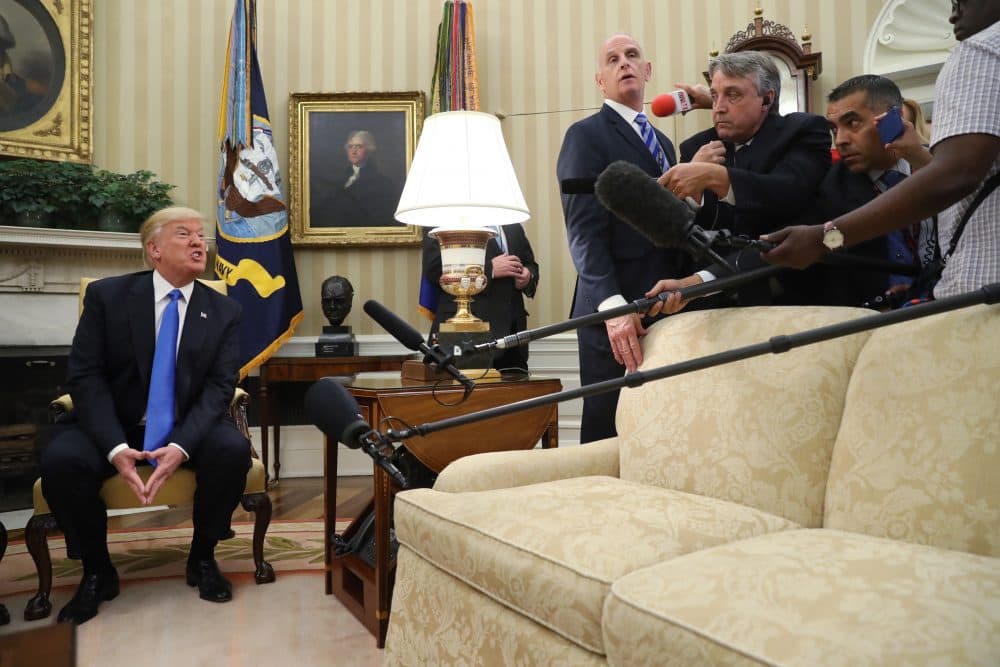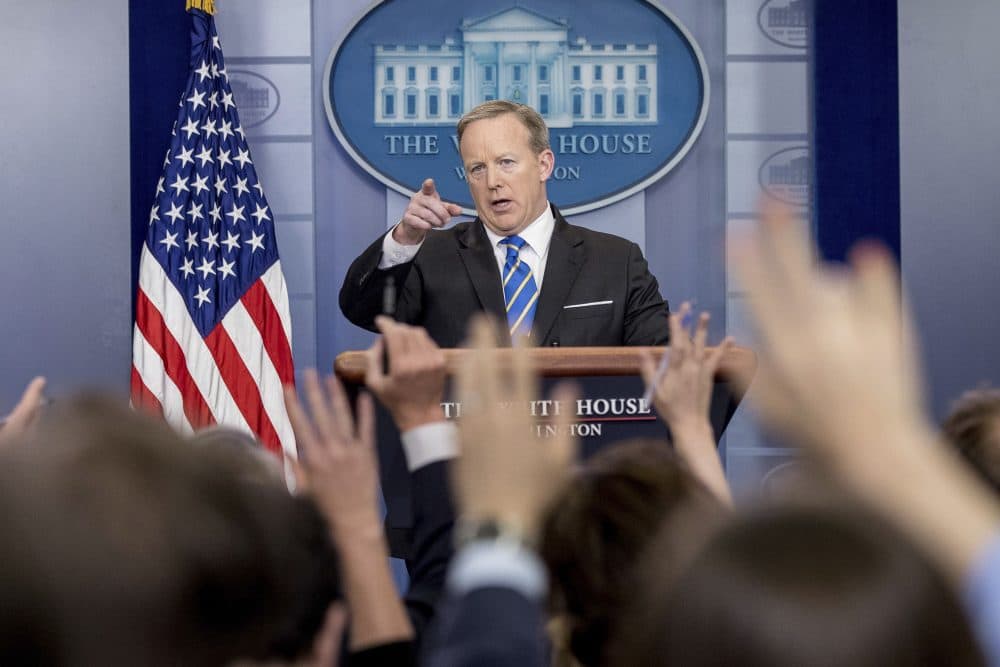Advertisement
Commentary
Truth, Lies And Democracy: What Is Journalism's Obligation In The Trump Era?

A little more than three months ago, Steven Rattner, an economics and business contributing columnist for The New York Times, offered a stunning look at what has become the unfortunate norm of the Trump administration.
As Rattner wrote, “watching administration officials play cat and mouse with Sunday talk show hosts is a hoary Washington tradition. But yesterday, Trump spokesmen offered a remarkably large number of flat out untruths as they attempted to defend the Republican health care plan.”
Rattner went on to list 11 untruths — he diplomatically avoided use of the L Word — from a handful of Trump administration officials, ranging from the vice president, Mike Pence, to Gary Cohn, director of the National Economic Council. House Speaker Paul Ryan also made the list.
This was on one Sunday in March.
If this were an aberration, maybe we, as journalists, could deal with it. But unfortunately, it is an ongoing phenomenon, starting with the president himself.
Spin is one thing. Actual lying is something quite different.
Both The New York Times and The Washington Post have fact-checkers to examine many of the administration’s claims. The Post counted nearly 500 lies or misleading statements from the president alone in just his first 100 days. The Toronto Star counted 18 misstatements or lies just from Trump’s recent Iowa appearance. Last weekend, the Times published a stunning piece, cataloging Trump's lies by the day. The president, the piece said, is "trying to create an atmosphere in which reality is irrelevant."
So what should journalists do when faced with such blatant and consistent lying from Trump and his surrogates?
Getting lied to is part of dealing with the coverage of individuals who have power and make decisions. When I covered the NBA for the Boston Globe, we referred to such things as “little fibs.” Or even non-denial denials.
This is different. This is a pattern of deception that has been going on ever since Trump descended the escalator in his lavish tower to announce his candidacy. It has continued since his election and inauguration, including, but not limited to, his hapless cabal of “spokesmen” and “spokeswomen” ranging from Sean Spicer to Kellyanne Conway.
It is long past time for the men and women who run our network and cable television news divisions to stop inviting known prevaricators onto their talk or news shows. This would immediately accomplish two things: it would demonstrate that there is some appreciation for the truth and it would deprive Trump and his surrogates of what they crave — and need — the most: exposure.

Frankly, what is preventing those news executives from doing so escapes me. Maybe it’s because we have been mired so long in the muck of false equivalence that television — and, to a lesser extent, newspapers — find it hard to shed the "he said, she said" model.
But what is journalism’s obligation here — to tell its viewers and readers the truth? Or to knowingly showcase individuals who will not tell the truth? Spin is one thing. Actual lying is something quite different. If you want someone on your Sunday talk show to talk about the American Health Care Act, it isn’t hard to find someone like Rattner. Or the estimable Julie Rovner, the former NPR health correspondent who is the chief Washington correspondent for Kaiser Health News.
That is what "Meet The Press" used to do (hence, its name). But now the daily cable news beast needs to be fed, so we have CNN with a dizzying array of talking heads to supposedly offer up opposing views. As Seth Meyers put it when riffing on the recent Shakespeare in the Park production of Julius Caesar, “if you want to see a Shakespearean drama based on Trump, just watch CNN.”
The first place to start is with those ridiculous White House briefings. Journalists should stop going to them. This is in no way to suggest journalists stop speaking to sources within the administration (which has more than its share of leaks), but rather to end the charade that these “briefings” actually deliver anything newsworthy.
we have been mired so long in the muck of false equivalence...
The White House has already cut back on its on-camera briefings, which hurts the poor folks at CNN. (The cable outfit sent a sketch artist to one, off-camera briefing last week. Why? Go out and cover the news and stop listening to Spicer.)
Then put a total ban (to parse a favorite Trump phrase) on all administration officials on news shows until further notice. I’d go a step further and eliminate Members of Congress as well. Present people who know something about the subject who do not have an ax to grind. Elevate the discourse.
I’m not holding my breath that CNN or FOX will take these steps. But what about CBS, ABC and NBC? How many more hours of misleading and even false statements are they going to subject us to as viewers, all in name of getting both sides of the story?
It is time to reassess how we cover the policies of an administration that compulsively lies. Putting a stop to showcasing its liars would be an excellent first step.
